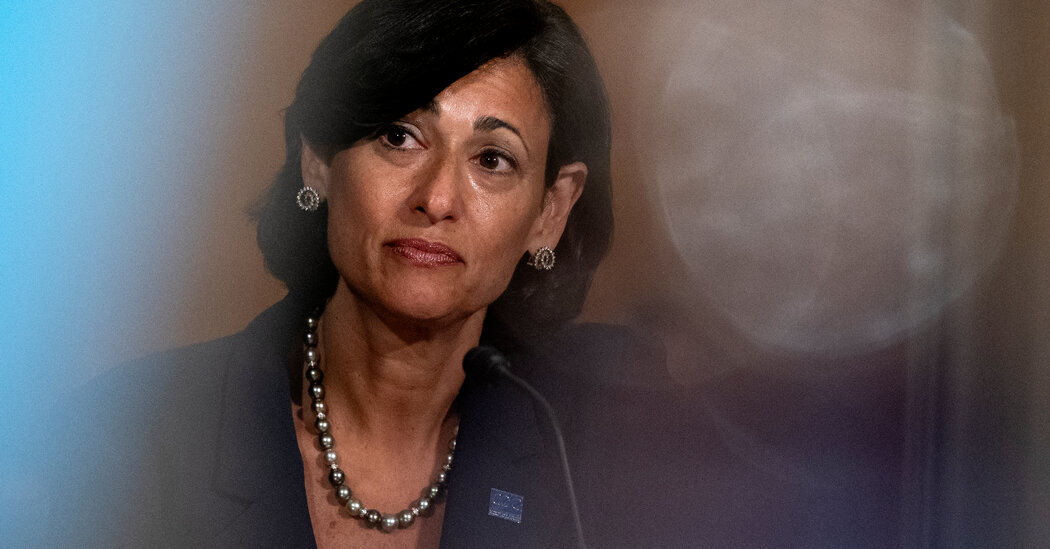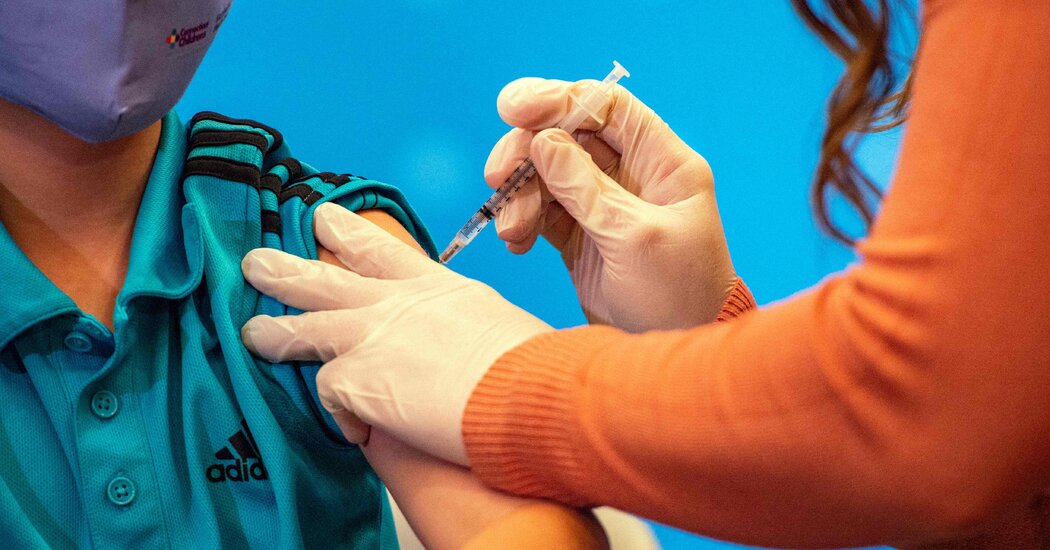Walensky Resigns as C.D.C. Director
In an announcement on Friday, the head of the beleaguered agency said she would step down in June. “We made this world a safer place,” she said.Dr. Rochelle Walensky, the director of the Centers for Disease Control and Prevention, will step down from her position on June 30, she announced on Friday, capping a tumultuous tenure at the nation’s leading public health agency as it struggled to rein in the Covid-19 pandemic, the greatest threat to American well-being in decades.Her departure comes as the administration contends with major vacancies in its Covid-19 response team. Dr. Ashish Jha, the White House’s Covid-19 coordinator, plans to leave his position this month, along with other key officials, including Dr. Nahid Bhadelia, a White House adviser on the global response. A new White House pandemic office has no leader or staffing.The administration plans to end the public health emergency on May 11, closing major programs — like access to free tests — that had helped sustain Americans through the worst days of the pandemic.But the virus has not disappeared. It is still killing roughly 1,000 Americans each week and hospitalizing even more. The leadership vacuum arrives at a precarious time.In an agencywide meeting, Dr. Walensky admitted to having mixed emotions about her decision and broke down in tears, according to people who had been on a conference call with her.“I took on this role with the goal of leaving behind the dark days of the pandemic and moving the C.D.C. — and public health — into a much better and more trusted place,” she said in a subsequent email to the agency’s staff.Dr. Walensky did not respond to a request for comment. Senior administration officials and outside experts have said that Dr. Walensky struggled with an unwieldy leadership structure at the Department of Health and Human Services, of which the C.D.C. is a part. The agency’s relationship with the White House was sometimes tense, as her advice to the public sometimes seemed confusing or contradictory.A person familiar with her thinking said that Dr. Walensky had also wearied of harassment from members of the public who were unhappy with pandemic restrictions and of long commutes between the C.D.C.’s offices in Atlanta and her home in Massachusetts.Andy Slavitt, a key adviser on the White House Covid-19 team in 2021, praised Dr. Walensky’s efforts to do a job “that’s easy to criticize and tough to do.”“You show up in an emergency status with a specific job to do,” he added. “It’s almost like a mission, with a beginning and end. Even though she was running an agency, running an agency during wartime is different than running an agency during peacetime.”Public health experts said the news had come as a surprise, and some expressed disappointment that she was leaving.“I think it is a loss for the C.D.C. and for the nation,” said Dr. Megan Ranney, the deputy dean for Brown University’s School of Public Health. “I know that it has not been easy, not just because of Covid but because of the politicization of science.”Dr. Ranney said that she had received hate mail and personal attacks but that what she had experienced was “only the tip of the iceberg” compared with how Dr. Walensky had been treated.Dr. Celine Gounder, a former adviser to the Biden administration who has known Dr. Walensky since 2004, said, “Her departure signals to me that the C.D.C. is more broken and the federal government’s commitment to public health is even weaker than I’d thought.”Dr. Walensky grew up in Potomac, Md., in a family of respected scientists. She trained in medicine at Johns Hopkins University and, in 2001, joined the faculty at Harvard, where she developed a reputation as a rigorous researcher and a generous mentor.Before her tenure as C.D.C. director, Dr. Walensky led the infectious diseases division at Massachusetts General Hospital, where she saw the pandemic’s devastation firsthand. She was noted for her work on health care policy, particularly in H.I.V.Dr. Walensky with Dr. Anthony Fauci, left, and Dr. David Kessler, a top Covid-19 adviser, in 2021.Amr Alfiky/The New York TimesBut with little experience working in government and leading large institutions, Dr. Walensky was an unexpected choice to guide an agency with a staff of about 11,000 people.Dr. Walensky took the helm of the beleaguered agency in January 2021. She had a near-impossible task ahead of her: restoring the reputation of the once-storied C.D.C. when public trust in the agency, and science more broadly, was fast ebbing.The C.D.C. had been pilloried since the start of the pandemic for missteps in testing, changing advice on masking, and antiquated surveillance and data systems. Trump administration officials hectored the agency’s leaders, rewrote its guidance and meddled with its research reports, undermining the morale of scientists even as the crisis ballooned.“She insisted that people act more promptly and in a more focused way, so she stimulated people to do things perhaps a little bit differently than they had,” said Dr. William Schaffner, an infectious diseases physician at Vanderbilt University who works closely with the agency.“Morale within the C.D.C. distinctly improved under her leadership,” he added.But the pandemic proved to be rough ground even for someone as respected and well-liked as Dr. Walensky. She was roundly criticized by experts for advising people to stop wearing their masks just weeks before the Delta variant of the coronavirus pummeled the nation.And after shortening isolation requirements even as the Omicron variant brought the country to a standstill, she was accused of letting economic interests outweigh scientific caution.Anne Sosin, who studies health equity at Dartmouth, said that Dr. Walensky had sometimes taken the fall for Biden administration decisions, but that she also could have done more to level with the public about the rationales for those decisions.Still, Ms. Sosin added, “From the outside, it has sometimes appeared that Dr. Walensky has lacked the courage to say no to decisions that really undermined public health.”Republicans in Congress repeatedly asked for her resignation and painted the agency as a failed institution in hearings on the pandemic. But some experts felt Dr. Walensky had done her best with an impossible hand.“The public — and even health professionals — wanted consistency in message and messaging that was not possible, because Covid has simply never been a static threat,” said Dr. Jeremy Faust, an emergency medicine physician and health policy expert at Brigham and Women’s Hospital in Boston.Dr. Daniel Pollock, who led Covid surveillance for a few months in 2020 and retired in November 2021 after 37 years at the agency, said: “The timing of this leadership transition is very problematic. I worked at C.D.C. under 10 different directors, and when they leave abruptly, for whatever reason, the ripple effects take a big toll.”It was not immediately clear who would lead the C.D.C. after Dr. Walensky’s departure. Some scientists said Dr. Walensky’s successor should be a public health generalist attuned to social problems and how to run a large federal agency, not a physician-scientist like Dr. Walensky.“This has to be a public health person,” said Katelyn Jetelina, an epidemiologist who writes a popular newsletter and has been advising the C.D.C. for the past year. “We think about treating millions of people at one time, rather than this initial training of one-on-one physician care.”Despite the controversy surrounding her tenure, Dr. Walensky’s email to staff members on Friday suggested that she believed she had improved the agency’s standing.“We collectively moved C.D.C. forward, reorganizing the agency and embarking on the necessary work to orient the enterprise toward public health action and foster accountability, timeliness and transparency in our work,” she said.During her time at the C.D.C., Dr. Walensky noted, the agency administered more than 670 million Covid vaccine doses and provided guidance on immunization, social distancing and masking that “protected the country and the world from the greatest infectious disease threat we have seen in over 100 years.”Dr. Walensky acknowledged the agency’s failings last year and promised to reorganize it, transforming its ability to respond quickly to public health crises. Some organizational changes have been announced, but it is unclear whether any of them have made a material difference in the C.D.C.’s work.Among other changes, Dr. Walensky helped create an office that’s more organized and empowered to work with state and local health developments, said Dr. Joshua Sharfstein, vice dean for public health practice and community engagement at the Johns Hopkins University Bloomberg School of Health.“It puts the agency in a position to have a vision for how the nation’s very convoluted public health system holds together,” he said. “One of the jobs as the director is going to be to take the structure that Dr. Walensky has left and use it.”Under her leadership, Dr. Walensky said in her email to staff members, the agency bolstered its public health infrastructure and secured hundreds of millions of dollars to modernize the country’s data infrastructure.She also declared racism a serious public health threat, she noted, and led the agency in its efforts to contain a multinational mpox outbreak, as well as the spread of Ebola in Uganda.“We made this world a safer place,” Dr. Walensky said. “I have never been prouder of anything I have done in my professional career.”Emily Anthes
Read more →

